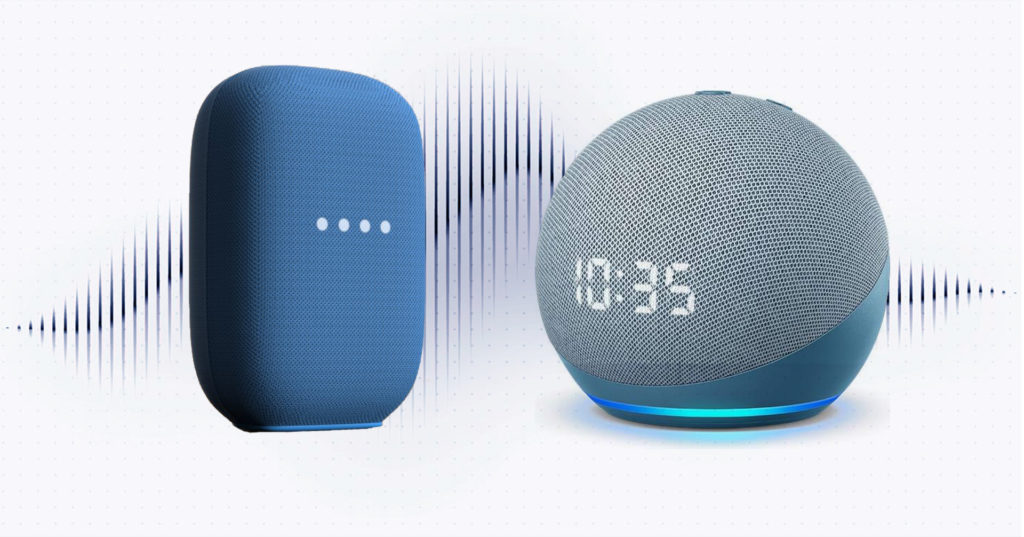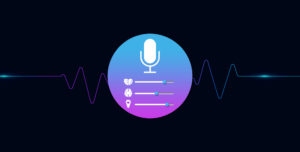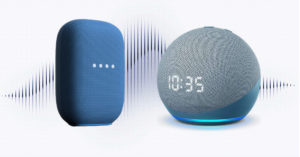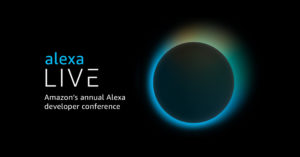Table of Contents
This is a detailed blog comparing Google Assistant and Amazon Alexa.
Back in the old days, shouting across the room to an impersonal speaker asking about the weather would have been rather wild, not to mention the few awkward conversations that may have followed right after. Cut to today, we operate our lights, coolers, and other appliances without moving a muscle and don’t give it a second thought. It is only possible with smart speakers like Alexa and Google Assistant that have changed the way several tasks are done.
Alexa is a voice assistant developed by Amazon, and Google Assistant, well, by Google. After gaining massive popularity over the years, 8.4 billion devices with digital assistants are estimated to be in use by 2024! Leading in the industry, Alexa and Google Assistant offer, on paper, many of the same features and functions and yet have their own pros and cons. The two are developing quickly, but let’s take a look at how they fare today:
Communication - Phone Calls, Video Calls, Texts
One can only talk to an inanimate speaker for so long! Thankfully, both of these speakers can connect you to your contacts.
Alexa has an easy upper hand here as most non-emergency or landline phones can be contacted using Alexa’s speakers. Calls and messages (in audio and text) can go out to other Alexa users and any other number in your list of contacts.
Additionally, Echo Show displays support audio calls and video calls made using Amazon’s own backend, Zoom, or Skype. People who don’t have a show can use the Alexa app to take (or make) calls using that third option. Alexa also offers an intercom feature that allows you to broadcast a message to other Echo devices around.
With calls confined to Google Duo, Google Contacts, or the few carrier partnerships Google has globally, Google Assistant is somewhat limited on smart speakers and displays. Sending text messages on Google Assistant requires some workaround with IFTTT and international calls can be made if credits are available on Google Fi or Google Voice. Google Duplex, which may book some reservations for you or keep your place in an automated phone system, is Assistant’s great asset for smartphones.
We have written a dedicated blog covering calling and messaging through Alexa. You can read that blog once you have completed this one.
Wide Range of Smart Speakers
Smart speakers have made lives easier. These handy speakers can be controlled from a distance using voice commands and to operate other smart home devices like lights and thermostats. Among other brands, Amazon Alexa and Google Home have come up with a variety of speakers, each more advanced than the previous one.
Amazon’s Echo range of speakers has set the benchmark high for online reviewers to judge other smart speakers. They are by far the best in the industry. From the cheapest option on the list, an Echo Flex that can be plugged to a wall outlet, Echo Dot (5th Gen) with better music quality and Echo (4th Gen) that is ideal for a smart home with a ton of sensors as well as Echo Studio with outwardly music quality to non-traditional speakers like Echo Auto and Link for cars and stereo systems, respectively. Amazon’s experimentation continues with Echo Buds and Frames for personal audio, and a lot more to come!
Google offers a smaller range of speakers than Amazon. Google Nest Mini has replaced Home Mini by offering the same features with additional convenience that was missing, such as the built-in wall mounting option. Then there is Google Nest Audio, suitable for larger rooms and Google Home Max (now discontinued), the largest smart speaker. Topping all of that is Google’s brand new Pixel tablet that comes with a speaker dock, transforming the tablet into a smart display. Other smart speakers by Google already serve another purpose. Google Assistant is only a bonus in Google Nest Wi-Fi, Nest Cam IQ Indoor functioning as a security camera and Google Nest Cam Battery. Google, although lacking the variety, has done a great job in perfecting devices for particular scenarios.
General Knowledge
In terms of general knowledge, both of these voice assistants fared well in terms of answers and comprehension, requiring little to no rephrasing or asking twice. Alexa is seen to perform generally better with quality answers provided quickly.
And while Google Assistant comes pretty close with its solid, fast answers, it often suggests reading a piece of information or provides the answer in an onscreen display. For example, Alexa can give you a precise answer as to when was the last season of Game of Thrones held whereas Google Assistant shows the summary of that particular season. Clearly, Alexa has scored a point over Google Assistant in general knowledge.
Responsiveness
Typically, Alexa only understands specific commands. Amazon has done a good job of allowing for alternative wording — for example, “turn the volume to 10” has the same result as “set the volume to 100%” — but it may still get confusing.
Although it won’t pass for a person, Google Assistant is better at understanding the context. The Assistant will comprehend your request to “turn off the TV lights,” for example, if you have accessories with the names “TV Light 1” and “TV Light 2.” To achieve the same result with Alexa, a “TV Lights” group must be created.
Sound Quality of Speakers
Alexa gives Google an edge here with its wide range of speakers we mentioned earlier. Echo Studio tops the list, after the discontinued Google Home Max with loud, vibrant audio and can surround a room with directional sound. Long live the angled drivers!
With usually good audio quality that can readily fill a room, the Echo and Nest Audio sound similar in terms of their midrange models. Although the Nest Audio has a little less bass and the Echo has less treble finesse, both devices nonetheless provide high-quality music for their size and price. The Nest Mini, a device that is a step down from those, has a weaker bass and midrange than the Echo Dot. Of course, these relatively compact speakers are much more suited for nightstands and desktops than acting as a room’s dominant audio device.
Integration with Home and Other Devices
Alexa is capable of almost every thing that its counterpart Google Assistant is. Alexa is the brain behind the whole family of Amazon Echo devices and a variety of smart home gadgets, including smart hubs, security cameras, smart locks, smart switches, smart plugs, and more. A smaller number of smart home appliances, such as Google Nest Hub, Google Home, Chromecast, smart thermostats, smart plugs, smart cameras, home security systems, etc., are integrated with Google Assistant.
The built-in Google Assistant in the majority of Android and Wear OS devices, as well as anything using Chrome or Android Auto, is a clear benefit for Google. In contrast, if the gadget is not an Amazon product, you are required to install or activate Alexa. Although third-party smart displays are uncommon, Lenovo produces Assistant displays like the Smart Clock 2 and Facebook’s Portal devices support Alexa.
Entertainment - Music and Video
It should come as no surprise that Alexa and Google Assistant can play music from streaming services for you, given that both voice assistants are integrated into smart speakers and smart displays. Along with Apple Music, Deezer, Spotify, Pandora, Tidal, and Vevo, Alexa is able to play Amazon Music. At the same time, Google Assistant adds support for YouTube Music and supports all the others, except Tidal and Amazon Music.
Both Alexa and Google Assistant can set up multi-room audio systems in your house that can simultaneously play music on all the speakers if you have over one compatible smart speaker or smart display. While you wander about the house, the Google Assistant can even shuffle music between the various smart speakers and displays for you, although Alexa does not support this feature yet.
Additionally, when used with a compatible TV streaming device, such as an Amazon Fire TV for Alexa or a Google Chromecast (or a TV with built-in Chromecast) for Google Assistant, both voice assistants can control the playback of streaming services like Prime Video and Google Play, respectively.
Do you know there are a lot of hidden Alexa commands that you can use to keep yourself engaged? Check out our blog on top funny things you can ask Alexa.
Voice Recognition
Virtual or not, reliability is important for any sort of assistant. Google Assistant and Amazon Alexa definitely check this box when it comes to identifying and responding to your voice. Additionally, Alexa and Google Assistant can also identify distinct household voices to deliver customised results, such as calendar entries or callable contacts. Both voice assistants, referred to as Voice Match (by Google Assistant) and Voice Profiles (by Alexa), can flawlessly identify up to six distinct people so that you can use more individualised services.
Alexa excels in the realm of wake words. The wake words induce a lifelike response from the assistants within seconds. Google Assistant only supports the commands “OK Google” and “Hey Google,” whereas Alexa also supports “Computer,” “Echo,” “Amazon,” and (at least in the US, Canada, and UK) “Ziggy.” Although the wake words for Google Assistant cannot be changed, consistency can be very helpful when speaking to a little piece of technology.
There is no need to repeat the wake word if you follow up your initial order or request with another one after a short time because both these assistants support ongoing conversations. Moreover, according to Amazon, Alexa is projected to be able to hold multiple simultaneous conversations. In voice recognition, Alexa wins as it offers much more.
Bottom Line
Google Assistant and Amazon Alexa are like two peas in a pod. And with each upgrade, the difference between Alexa and Google grows more narrow. The major distinction lies in how each system handles particular activities. Essentially, both the speakers are workable, it only boils down to your needs and preferences. If your needs include developing an Alexa Skill or voice trends using Google Assistant Skill for your business, Boltd is your knight in shining armor!





